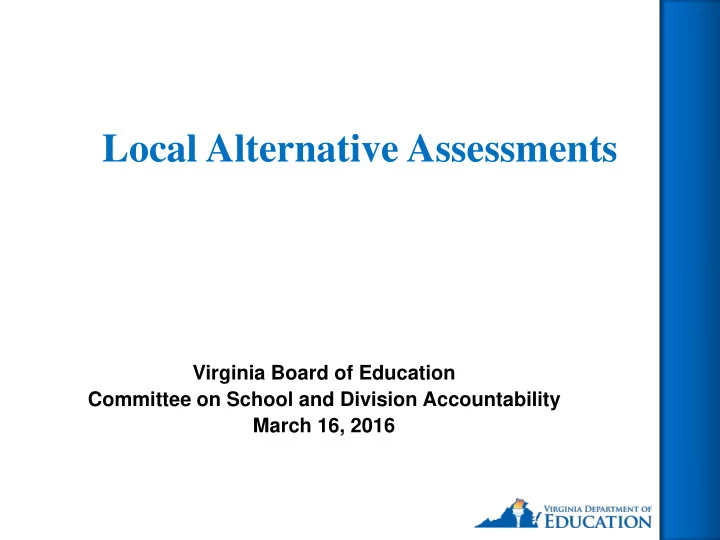

Local Alternative Assessments Virginia Board of Education Committee on School and Division Accountability March 16, 2016
Background: Legislative Mandate Legislation in the 2014 General Assembly amended § 22.1-253.13:3.C of the Code of Virginia to eliminate several Standards of Learning (SOL) tests: • Grade 3 History, • Grade 3 Science, • Grade 5 Writing, • United States History to 1865, and • United States History: 1865 to the Present.
Requirements for Local Alternative Assessments The legislation required each local school board to annually certify that it has provided instruction in the content assessed by the eliminated tests, and administer an alternative assessment, consistent with Virginia Board of Education guidelines, to students in grades three through eight in each SOL subject area in which the SOL assessment was eliminated.
Plans for Use of Local Alternative Assessments • School divisions were asked to prepare plans that describe how local assessments designed to inform instruction would be implemented in 2014- 2015 as well as how their use would be expanded in 2015-2016 and beyond. • Desk reviews of selected school divisions as required by the guidelines were conducted during the summer of 2015. • Purpose of the “desk reviews” was to determine the types of alternative assessments that were administered. Reviews will also help Department staff to identify “best practices” for sharing and distribution to other Virginia school divisions. 4
Desk Review of Local Alternative Assessments • VDOE selected three school divisions from each of the eight regions • Requested information for two assessments from each school division, resulting in 48 assessments being submitted • Chose a diverse selection of school divisions: 6 Rural, Distant 5 Rural, Fringe 4 Suburb, Large 5 Town, Distant 1 City, Middle 3 City, Small
Summary of Desk Review Results Type of Assessment 25 20 15 Type of Assessment 10 5 0 MC/TEI only MC/TEI with Performance Performance Task Assessment 6
Sample Performance Assessment Grade 3 Science 7
Sample Performance Assessment Grade 3 History 8
Combined US History 1 and Grade 5 Writing Task 9
Sample Performance Assessment US History I 10
Sample Performance Assessment Grade 5 Writing 11
Sample Performance Assessment US History II 12
Local Alternative Assessments: Transition to New Paradigm in Teaching and Learning 13
Assistance Through Regional Grants • Many school divisions have been working in their regions to develop performance assessments through grants that were provided by the Department. • Several school divisions plans mentioned implementing local alternative assessments that incorporated performance tasks in the future, as a result of this regional work. 14
WHY? • Incorporate options for age appropriate authentic performance assessments and portfolios with rubrics and other methodologies designed to ensure the students are making adequate academic progress in the subject area and that the Standards of Learning are being taught • Permit and encourage integrated assessments that include multiple subject areas • Emphasize collaboration between teachers to administer and substantiate the assessments and the professional development of teachers to enable them to make the best use of alternative assessments
WHAT? • Establishment of a consistent understanding of alternative assessments, • Identification of the characteristics of well-constructed alternative assessments, • Development of rubrics to assess student mastery of content and skills, and • Analyses of data from the alternative assessments to identify students’ strengths and weaknesses to guide instruction.
HOW? • Regional Grants to support transformation of assessment options in Virginia, changing the teaching and learning paradigm. • Collaboration between teachers and central office within and across districts in each region. • Teacher created assessments and rubrics. • Learning together to change teaching and learning in order to prepare Virginia students to learn in ways that include demonstrating content knowledge and essential life skills that prepare them for their future.
HOW? • University and professional organization partnerships for professional development • University of Virginia • College of William and May • James Madison University • Old Dominion University • Virginia Commonwealth University • George Washington University • VASCD • VASS • VSUP
HOW? Ongoing Process to Build Capacity Learning Expansion and Development of Refinement tasks and rubrics Revision Pilot
WHEN? 2014-2020 2014 2016-0n-going House Bill to remove SOL 2016-2020 assessments and to direct Focus on tasks, rubrics, Differentiated Supports to districts to develop and fidelity, and expansion to Divisions implement alternative other subjects assessments 2016-2017 Regional Alternative 2014-2016 Assessment “banks” District Self Assessment Region Grants developed Accountability to Framework 2014-2020 Spring 2016 Regional Labs of Learning Regional Leaders and DOE for Development of tasks and develop state framework rubrics
Challenges • Need for Region to Region communication to develop state consistency • Need for TIME to transform teaching and learning. The change from multiple choice format requires new teacher skills for both instruction and assessment • Need for flexibility in use of state funds that support region work for use in summer, all districts are supplementing funding to support this work in challenging budget times. • Uncertainty about Virginia expectations, schools in sanctions prioritizing work • Ensuring all divisions engage in journey
Celebrations • All Regions engaged in the work of transforming assessment with collaboration among many divisions in each Region • Many Regions using similar professional development creating commonalities across the Commonwealth • Powerful teacher collaboration in each Region’s professional development offerings. Teachers working with central office to develop tasks and rubrics. Virginia has great teachers engaged in this work • Desire for Region communication
Recommend
More recommend